bill of rights
 Religious beliefs have caused a number of issues in governments over the centuries, sometimes pitting family members against family members. They were, in fact, the main reason that the United States was founded…to get away from religious persecution. Such was also the case in the coup that was called Britain’s Bloodless Glorious Revolution. At the time, King James II was the king in Britain, and he was a Catholic. At first that didn’t seem like a huge problem, but King James’s policies of religious tolerance after 1685 began to meet with increasing opposition from members of leading political circles, who were troubled by the King’s Catholicism and his close ties with France. The crisis facing the King came to a head in 1688, with the birth of his son, James Francis Edward Stuart, on June 10. This changed the existing line of succession by displacing the heir presumptive, his daughter Mary, a Protestant and the wife of William of Orange, with young James Francis Edward as heir apparent, because at that time it was the first born “son” who inherited the throne. The establishment of a Roman Catholic dynasty in the kingdoms now seemed likely, and the people weren’t happy about it.
Religious beliefs have caused a number of issues in governments over the centuries, sometimes pitting family members against family members. They were, in fact, the main reason that the United States was founded…to get away from religious persecution. Such was also the case in the coup that was called Britain’s Bloodless Glorious Revolution. At the time, King James II was the king in Britain, and he was a Catholic. At first that didn’t seem like a huge problem, but King James’s policies of religious tolerance after 1685 began to meet with increasing opposition from members of leading political circles, who were troubled by the King’s Catholicism and his close ties with France. The crisis facing the King came to a head in 1688, with the birth of his son, James Francis Edward Stuart, on June 10. This changed the existing line of succession by displacing the heir presumptive, his daughter Mary, a Protestant and the wife of William of Orange, with young James Francis Edward as heir apparent, because at that time it was the first born “son” who inherited the throne. The establishment of a Roman Catholic dynasty in the kingdoms now seemed likely, and the people weren’t happy about it.
Some Tory (conservative) members of parliament worked with members of the opposition Whigs in an attempt to resolve the crisis by secretly initiating dialogue with William of Orange to come to England…outside the jurisdiction of the English Parliament. Stadtholder William, the de facto head of state of the Dutch United Provinces, feared a Catholic Anglo–French alliance and had already been planning a military intervention in England, so he was very much open to the plan. After consolidating political and financial support, William crossed the North Sea and English Channel with a large invasion fleet in November 1688, landing at Torbay in Devonshire with an army of 15,000 men, William advanced to London, meeting no opposition from James’ army, which had deserted the king. After only two minor clashes between the two opposing armies in England, and anti-Catholic riots in several towns, King James’s regime collapsed, largely because of a lack of resolve shown by the king. Following Britain’s Bloodless Glorious Revolution, Mary, the daughter of the deposed king, and William of Orange, her husband, are proclaimed joint sovereigns of Great Britain under Britain’s new Bill of Rights. At first I thought that odd, because by rights she would have been in the royal line, but I suppose you would have to honor the warrior who made it all possible.
King James was allowed to escape to France, and in February 1689 Parliament offered the crown jointly to  William and Mary, provided they accept the Bill of Rights. The Bill of Rights, which greatly limited royal power and broadened constitutional law, granted Parliament control of finances and the army and prescribed the future line of royal succession, declaring that no Roman Catholic would ever be sovereign of England. The document also stated that Englishmen possessed certain inviolable civil and political rights, a political concept that was a major influence in the composition of the United States Bill of Rights, composed almost exactly a century later. The Glorious Revolution, the ascension of William and Mary, and the acceptance of the Bill of Rights were decisive victories for Parliament in its long struggle against the crown.
William and Mary, provided they accept the Bill of Rights. The Bill of Rights, which greatly limited royal power and broadened constitutional law, granted Parliament control of finances and the army and prescribed the future line of royal succession, declaring that no Roman Catholic would ever be sovereign of England. The document also stated that Englishmen possessed certain inviolable civil and political rights, a political concept that was a major influence in the composition of the United States Bill of Rights, composed almost exactly a century later. The Glorious Revolution, the ascension of William and Mary, and the acceptance of the Bill of Rights were decisive victories for Parliament in its long struggle against the crown.
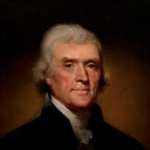 With everyone arguing about whether or not religion has a place in politics, today seemed a good day to discuss the common misconception people have about the constitutional amendment they so often quote as the basis for their arguments. Our founding fathers came to this country, largely because in England they were forced to attend the Church of England…by law. Whether they agreed or not, or even whether the church was teaching correctly or not, was completely irrelevant. That was the church, and that was where people were expected to go. For any who wonder why so many of us are against the influx of Muslims, this is the reason…not because we disagree with their religion, but because it is the goal of Islam to force the entire world to convert to Islam. Our founding fathers, and indeed most Americans believe so strongly in the right to choose which religion, or even the lack of a religion, we want to practice, that we are willing to fight to keep that right. This amendment is simply not negotiable.
With everyone arguing about whether or not religion has a place in politics, today seemed a good day to discuss the common misconception people have about the constitutional amendment they so often quote as the basis for their arguments. Our founding fathers came to this country, largely because in England they were forced to attend the Church of England…by law. Whether they agreed or not, or even whether the church was teaching correctly or not, was completely irrelevant. That was the church, and that was where people were expected to go. For any who wonder why so many of us are against the influx of Muslims, this is the reason…not because we disagree with their religion, but because it is the goal of Islam to force the entire world to convert to Islam. Our founding fathers, and indeed most Americans believe so strongly in the right to choose which religion, or even the lack of a religion, we want to practice, that we are willing to fight to keep that right. This amendment is simply not negotiable.
Nevertheless, the misconception comes when people misstate the first amendment, claiming that it means that religion has no place in politics. That statement is fundamentally wrong, and not what Thomas Jefferson had in mind when in 1779, he wrote the “Bill for Establishing Religious Freedom.” America was settled by people who wanted religious freedom, and Jefferson believed in freedom of religion, too. He didn’t believe that churches 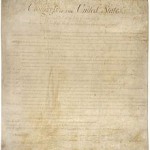 should be funded by taxes, thereby giving the government authority in the beliefs of the church. The bill said that “no man shall be compelled (forced) to frequent (go to) or support any religious worship, place or ministry whatsoever.” Some people were against it even then, and it did not become law at that time. It did, however, create a friendship between Jefferson and James Madison, who believed the say way.
should be funded by taxes, thereby giving the government authority in the beliefs of the church. The bill said that “no man shall be compelled (forced) to frequent (go to) or support any religious worship, place or ministry whatsoever.” Some people were against it even then, and it did not become law at that time. It did, however, create a friendship between Jefferson and James Madison, who believed the say way.
In 1784, Jefferson left for Paris, France to perform his duties as US foreign minister to France. That left James Madison with the task of making the bill into law. No easy task, because it had failed on its first attempt. Undaunted, Madison presented the bill to the Virginia Assembly, and with a few minor changes, it passed in 1786. Elated, Madison sent word to Jefferson in Paris. When the bill passed, Virginia became the first state to free religions from state rule. It is still part of Virginia’s constitution. It was used as a model for other state’s constitutions. It was also used as a model for the religious language in the Bill of Rights: “Congress shall make no law respecting an establishment of religion, or prohibiting the free exercise thereof.” If people would read the Constitutional amendment and the Bill of Rights carefully, they would, indeed find that it says nothing at all about keeping religion out of politics, and everything about keeping the government out of religions. Thomas  Jefferson believed the Virginia Statute of Religious Freedom was one of his greatest achievements. So strongly did he believe in his accomplishments, that he wanted his tombstone to list the “things that he had given the people.” It reads: “Here was buried Thomas Jefferson Author of the Declaration of Independence of The Statute of Virginia for Religious Freedom And Father of the University of Virginia.” Why did Jefferson want the Statute for Religious Freedom on his tombstone? It was because he could see what could happen when one religion was allowed to hold hostage the rest of the nation, or indeed, the world. That is why we will never give up the fight, and we will oppose all religions that would try to force themselves on us. People should stop using this convenient misconception to try to further their own agendas in this nation.
Jefferson believed the Virginia Statute of Religious Freedom was one of his greatest achievements. So strongly did he believe in his accomplishments, that he wanted his tombstone to list the “things that he had given the people.” It reads: “Here was buried Thomas Jefferson Author of the Declaration of Independence of The Statute of Virginia for Religious Freedom And Father of the University of Virginia.” Why did Jefferson want the Statute for Religious Freedom on his tombstone? It was because he could see what could happen when one religion was allowed to hold hostage the rest of the nation, or indeed, the world. That is why we will never give up the fight, and we will oppose all religions that would try to force themselves on us. People should stop using this convenient misconception to try to further their own agendas in this nation.
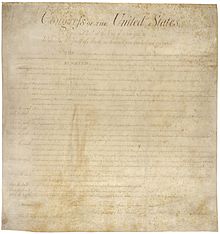 A few days ago, I wrote about the United States Constitution, and how it was ratified by Massachusetts, with the condition that it be amended to include some rights that they felt were very important. On this day, September 25, 1789, those amendments were created. The first ten became the Bill Of Rights. These amendments would not be ratified until December 15, 1791. These days, there is some confusion and some complete ignorance as to the meaning of some of these rights…especially the first amendment. I can’t count the number of times that I have heard that according to the constitution, we are to have separation of church and state. That could not be further from the truth, and in fact would be an impossibility. The very idea that a person who holds political office could separate his or her religious values from their voting on matters concerning laws of the land is insane, and it is not what our forefathers meant when the Bill of Rights was created. The first amendment reads, “Congress shall make no law respecting an establishment of religion, or prohibiting the free exercise thereof; or abridging the freedom of speech, or of the press; or the right of the people peaceably to assemble, and to petition the Government for a redress of grievances.” All the first amendment…the part concerning religion, anyway…means is that Congress in not allowed to make a law saying that the United States is going to be one certain religion. England had such a law, and that was one of the main reasons the pilgrims left there.
A few days ago, I wrote about the United States Constitution, and how it was ratified by Massachusetts, with the condition that it be amended to include some rights that they felt were very important. On this day, September 25, 1789, those amendments were created. The first ten became the Bill Of Rights. These amendments would not be ratified until December 15, 1791. These days, there is some confusion and some complete ignorance as to the meaning of some of these rights…especially the first amendment. I can’t count the number of times that I have heard that according to the constitution, we are to have separation of church and state. That could not be further from the truth, and in fact would be an impossibility. The very idea that a person who holds political office could separate his or her religious values from their voting on matters concerning laws of the land is insane, and it is not what our forefathers meant when the Bill of Rights was created. The first amendment reads, “Congress shall make no law respecting an establishment of religion, or prohibiting the free exercise thereof; or abridging the freedom of speech, or of the press; or the right of the people peaceably to assemble, and to petition the Government for a redress of grievances.” All the first amendment…the part concerning religion, anyway…means is that Congress in not allowed to make a law saying that the United States is going to be one certain religion. England had such a law, and that was one of the main reasons the pilgrims left there.
Religion has been in the news a lot lately, and there have been many arguments about it. Which brings me to the next part of the first amendment “or prohibiting the free exercise thereof.” People don’t have to agree with my views on religion, but they are prohibited from telling me that I cannot express my religious views in speech, or on the internet. There are a lot of people telling other people that they have no right to talk or post about their religion, but they are completely wrong. We have every right to do so. Contrary to what some people might think, these rights are not negotiable…they are absolute. I can’t tell others not to talk about their religion, and they can’t tell me not to. It is the law.
As to “or abridging the freedom of speech, or of the press; or the right of the people peaceably to assemble, and to petition the Government for a redress of grievances”, we may not always agree with what people say, and sometimes it isn’t nice, but they have a right to speak. They have a right to give their opinion, whether others like it or not. By the same token, we have the right not to like what is said, and thereby we can decide not to like the person. That is our choice. The same applies to the press. That is the main reason why so many people just don’t believe a word some rag newspapers print. They can say what they want…true or not.
There are so many other violations of the Bill of Rights, that it would take a book to list them all, but I would really encourage everyone to get a copy of the Bill Of Rights, and find out for yourself exactly what is written there. Every time we allow our rights to be trampled on, we lose a little bit of the rights that we were intended to have through the Constitution and the Bill Of Rights. The longer those violations are allowed to go 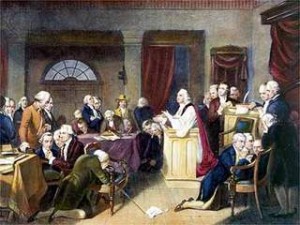 on, the more people think that they understand their rights, when they really don’t, and so they end up giving their rights away. Our Constitution and the Bill Of Rights, and indeed, all the amendments to the Constitution, are so important to each and every one of us, and we need to know what is there, so that when some branch of the government steps on those rights, and someone speaks out about it, we don’t find ourselves on the wrong side of the issue. It really isn’t about whether or not we agree with the issue, but whether or not it is legal, because if the government will take away one right illegally, they will also take away another right illegally, and someday, they will get to one that affects you…but by then, it may be too late to stop an already runaway government.
on, the more people think that they understand their rights, when they really don’t, and so they end up giving their rights away. Our Constitution and the Bill Of Rights, and indeed, all the amendments to the Constitution, are so important to each and every one of us, and we need to know what is there, so that when some branch of the government steps on those rights, and someone speaks out about it, we don’t find ourselves on the wrong side of the issue. It really isn’t about whether or not we agree with the issue, but whether or not it is legal, because if the government will take away one right illegally, they will also take away another right illegally, and someday, they will get to one that affects you…but by then, it may be too late to stop an already runaway government.
 The Constitution has been in the news a lot these days, or shall I say, the violation of the Constitution. Sometimes I wonder if the signers of the Constitution would even be able to recognize the nation that they had envisioned when they wrote the Constitution. I happen to think they would not, but then even at the signing of the Constitution there was controversy. In that way, I suppose there would always be those who would do everything in their power to change or even do away with the Constitution. At the time of the Constitutional Convention in Philadelphia, only 38 of the 41 delegates present at its conclusion, agreed to sign the document. There were those, even then, who disagreed with what was laid out there. I suppose that is common in anything in life. Needless to say, it was a hard-won battle to win the ratification by the necessary nine out of thirteen US states in existence at the time.
The Constitution has been in the news a lot these days, or shall I say, the violation of the Constitution. Sometimes I wonder if the signers of the Constitution would even be able to recognize the nation that they had envisioned when they wrote the Constitution. I happen to think they would not, but then even at the signing of the Constitution there was controversy. In that way, I suppose there would always be those who would do everything in their power to change or even do away with the Constitution. At the time of the Constitutional Convention in Philadelphia, only 38 of the 41 delegates present at its conclusion, agreed to sign the document. There were those, even then, who disagreed with what was laid out there. I suppose that is common in anything in life. Needless to say, it was a hard-won battle to win the ratification by the necessary nine out of thirteen US states in existence at the time.
Before the Constitution, the United States was operating under the Articles of Confederation, which was ratified several months before the British surrender at Yorktown in 1781. The Articles of Confederation and Perpetual Union were an agreement among all thirteen original states in the United States of America. Basically it was the first constitution. Even when not yet ratified, the Articles provided a system for the Continental Congress to direct the American Revolutionary War, conduct diplomacy with Europe, and deal with territorial issues and Native American relations, but it was weak in that it didn’t allow for our president, a court system, or taxation, thereby leaving us with a weaker government. Congress was also given no authority to enforce its requests to the states for troops, giving us a weaker military force. Yet, even with the proposed changes, there were those who would disagreed with the proposed new Constitution.
When the Constitutional Convention was convened on May 25, 1787, the plan had been to amend the Articles 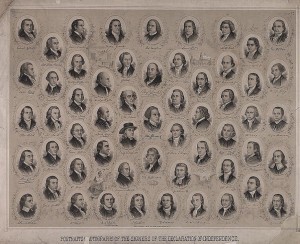 of Confederation, but that plan was quickly set aside in favor of writing a completely new Constitution. The meeting was held in Philadelphia’s Pennsylvania State House. It is now known as Independence Hall. Revolutionary War hero George Washington, a delegate from Virginia was elected as convention president. The debate was heated, but in the end, the delegates came up with a brilliant federal organization that boasted an intricate system of checks and balances. One of the main divisions in the discussions was that the more populated states wanted a state representation in Congress, and the smaller states wanted equal representation. That problem was solved by the Connecticut Compromise, which proposed a two chamber legislature with proportional representation in the lower house known as the House of Representatives and equal representation of the states in the upper house known as the Senate. It seemed a fair way to do it, but there are still those who disagree to this day.
of Confederation, but that plan was quickly set aside in favor of writing a completely new Constitution. The meeting was held in Philadelphia’s Pennsylvania State House. It is now known as Independence Hall. Revolutionary War hero George Washington, a delegate from Virginia was elected as convention president. The debate was heated, but in the end, the delegates came up with a brilliant federal organization that boasted an intricate system of checks and balances. One of the main divisions in the discussions was that the more populated states wanted a state representation in Congress, and the smaller states wanted equal representation. That problem was solved by the Connecticut Compromise, which proposed a two chamber legislature with proportional representation in the lower house known as the House of Representatives and equal representation of the states in the upper house known as the Senate. It seemed a fair way to do it, but there are still those who disagree to this day.
It would seem like they had an instant solution, but that wasn’t so. As dictated by Article VII, the document would not become binding until it was ratified by nine of the 13 states. On December 7, Delaware, Pennsylvania, New Jersey, Georgia, and Connecticut ratified the Constitution in quick succession. Other states, especially Massachusetts, opposed the Constitution, because it failed to reserve undelegated powers to the states and lacked constitutional protection of basic political rights, such as freedom of speech, religion, and the press, which I personally agree with. By February 1788, they had reached a compromise under which Massachusetts and other states would agree to ratify the document and that amendments would immediately be added to provide the protections they proposed. The Constitution was then narrowly ratified in Massachusetts. Maryland and South Carolina quickly followed. On June 21, 1788, New Hampshire became the ninth state to ratify the document, and it was agreed that government under the US Constitution would begin on March 4, 1789. In June, Virginia ratified the Constitution, followed by New York in July. The Constitution was signed on this day, September 17, 1787.
As promised, on September 25, 1789, the first Congress of the United States adopted 12 amendments to the 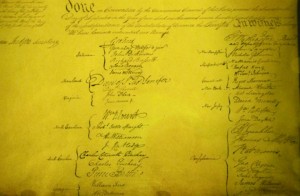 US Constitution, called the Bill of Rights. The Bill of Rights was then sent to the states for ratification. Ten of these amendments were ratified in 1791. In November 1789, North Carolina became the 12th state to ratify the US Constitution. Rhode Island, which opposed federal control of currency and was critical of compromise on the issue of slavery, resisted ratifying the Constitution until the US government threatened to sever commercial relations with the state. On May 29, 1790, Rhode Island voted by two votes to ratify the document, and the last of the original 13 colonies joined the United States. Today, the US Constitution is the oldest written constitution in operation in the world. That should say something, and it should be reason to protect it.
US Constitution, called the Bill of Rights. The Bill of Rights was then sent to the states for ratification. Ten of these amendments were ratified in 1791. In November 1789, North Carolina became the 12th state to ratify the US Constitution. Rhode Island, which opposed federal control of currency and was critical of compromise on the issue of slavery, resisted ratifying the Constitution until the US government threatened to sever commercial relations with the state. On May 29, 1790, Rhode Island voted by two votes to ratify the document, and the last of the original 13 colonies joined the United States. Today, the US Constitution is the oldest written constitution in operation in the world. That should say something, and it should be reason to protect it.

